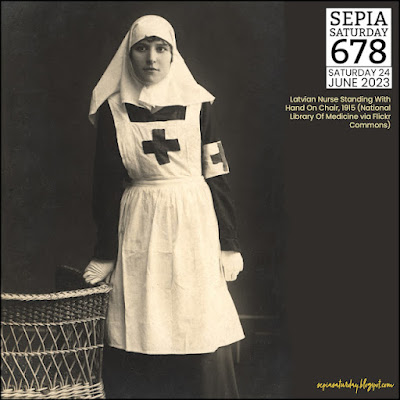NURSING THROUGH THE WARS
Forence Nightingale, “Lady
with the lamp”, at Barrack Hospital at Scutari (Ulskudar) in 1854 during the
Crimean War. Portrait published in 1891
by Cassell & Co. from a painting by Henrietta Rae.
Florence Nightingale “came to
prominence while serving as a manager and trainer of nurses during the Crimean War, in which she organized care for wounded soldiers at Constantinople. She significantly reduced death rates by improving
hygiene and living standards. Nightingale gave nursing a favourable reputation
and became an icon of Victorian
culture, especially in the persona of the “Lady
with the Lamp" making rounds of wounded soldiers at night.”
Clara Barton, Clarissa Harlowe Barton, “was an American nurse who founded
the American Red Cross. She was a hospital nurse in the American Civil War, a teacher, and a patent clerk. Since nursing education was not then very formalized and she did not
attend nursing school, she provided self-taught nursing care. Barton is
noteworthy for doing humanitarian work and civil rights advocacy at a time
before women had the right to vote. She was inducted into
the National Women's Hall of Fame in 1973.”
It is not widely known, but Calamity Jane (Martha Jane
Cannary) served as a nurse during the Civil War . . .
. . . as did poet, Walt Whitman! Whitman "volunteered as a nurse in the army hospitals during the
Civil War. He was inspired to do so after seeing the wounded soldiers in the
hospital where his brother was treated. He learned basic medical skills and cared for thousands of sick and
injured men. He also listened to their stories and wrote letters for them. He wrote a collection of poems called Drum-Taps based on his war
experiences.”
Helen Fairchild “was an American nurse who served as part of the American Expeditionary Force during World War
I, and who became known for her wartime
letters to her family in the U.S., which vividly depicted the realities of
combat nursing during World War I. She died of post-operative complications
after surgery for a gastric
ulcer while on duty
with British base hospital #10/#16 on the Western Front.”
She wasn’t quite 33 years old.
WW1 Nurse Agnes Glyn taken by ‘Bassano Limited’,
Photographers with studios at No. 25, Old Bond Street.
McCall’s 1918
The Pine Cone Performers, of which I was a member when we lived in
Groveland, had our share of nurses in various plays. Here are Nurse Wendy March & Dr. Phil
Good, heroine & hero in “Dogsbreath Devereaux, The Dastardly Doctor” or
‘Nurses! Foiled Again.’
Ivy Dripp was a nurse without a clue in “Dogsbreath—“ J
And here are the evil villains Nurse Hilda Hatchet
& Dr. Devereaux himself. I played
the part of their victim – Lotta Cash – whom Dr. Devereaux planned to marry so
he could inherit all her money, see to her demise, then marry Nurse Hatchet. What a fine upstanding peach of a fellow. L Fortunately
nurse Wendy March and Dr. Phil Good put an end to Dogsbreath’s evil plan.
And here, with a similar sounding name – what a
coincidence? ;) – is Nurse Ratched from 1975’s “One Flew Over The Cookoo’s Nest”.
This is Nurse Kelly (Kellye Nakahara) from the TV
show, M*A*S*H. I include her because
years ago I had a chance to talk with her on the phone about something and it
was fun and kind of exciting, having been watching her on the show for years.
Of course, thinking of M*A*S*H, one can’t leave out Nurse Margaret “Hot Lips” Houlihan seen here with Dr. Frank Burns.



















Great collection of nurses...and lots of theatrical ones too! Love the show MASH!
ReplyDeleteI watched MASH on Swedish television once upon a time, and later also bought the DVD box set.
ReplyDeleteNurses (the real ones, not the fictional kind) don't get nearly the credit they deserve. Despite all the advances of modern medicine, we still need the personal care, restorative skills, and experienced knowledge of nurses.
ReplyDelete